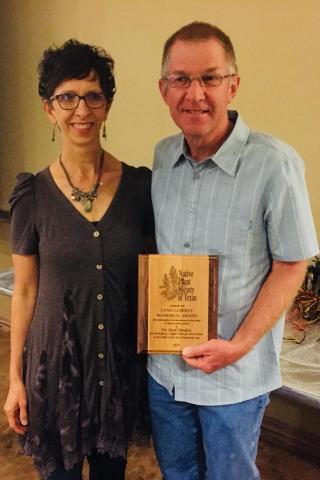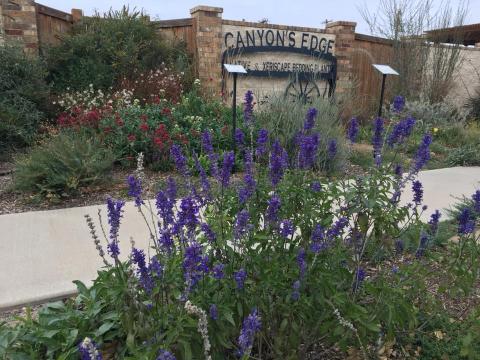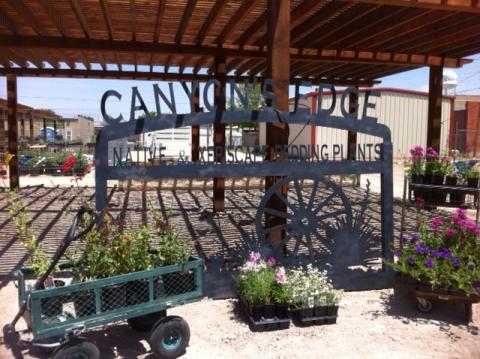
High Plains Gardening
The gardening website of the Texas High Plains Region

 Canyon’s Edge Plants closed for the season in early October, but work continues for Neal Hinders, 55 years young, owner, grower, plantsman, as he prepares for another season. Plants need to be sorted and repotted for growing over winter, demonstration beds mulched and more importantly, seeds and plugs ordered for next years business. Preparation is well under way for seeding out the hundreds of types of plants that will be on offer next April. (Photo at left of Neal and Nancy Hinders accepting his award, and on the right, from Canyon's Edge Plants Facebook page, with permission.)
Canyon’s Edge Plants closed for the season in early October, but work continues for Neal Hinders, 55 years young, owner, grower, plantsman, as he prepares for another season. Plants need to be sorted and repotted for growing over winter, demonstration beds mulched and more importantly, seeds and plugs ordered for next years business. Preparation is well under way for seeding out the hundreds of types of plants that will be on offer next April. (Photo at left of Neal and Nancy Hinders accepting his award, and on the right, from Canyon's Edge Plants Facebook page, with permission.)
By the end of December in the greenhouses on Country Club Road, 36 seeds are planted in 4 x 4 pots by the hundreds. Neal spends many hours each day in this month long process. After growing seedlings to the two to four leaf stage, the pots are poured out and the seedlings pricked out and placed in their own individual containers. This process is continued until multiple thousands of tiny seedlings are potted and placed side by side in his greenhouses, monitored with care. Some may find this process tense and tedious. As the cold north wind howls from the north, and maybe a snowflake or two floats down, Neal finds this winter greenhouse work relaxing as he thinks of the plants and gardens soon to come.
I recently visited with my long time friend, gardener, plant enthusiast, and gardening hero, Neal Hinders, after learning he was awarded the Lynn Lowrey Memorial Award by the Native Plant Society of Texas (NPSOT) for his passionate work in using and promoting native plants in private gardens and public spaces for the past 20 years at their annual symposium this November in Huntsville. The Lynn Lowrey Memorial Award is given for horticultural achievement in the field of Texas native plants. This award is not given every year. In the past five years, this award has only been given twice. And it is rare, indeed, for anyone from the Texas Panhandle to win a state-wide award, ever. Congratulations, Neal Hinders!
Neal is a fitting recipient of the Lynn Lowrey Memorial Award, as he is in many ways like Lynn R. Lowrey himself, for whom this award was established. Lynn Lowrey was known as a “quiet and unassuming” person who passionately went about his life studying plants, especially native plants, an apt description for Neal as well. Lowrey collected, propagated, and sold plants from his nursery in Houston; Hinders here in the Texas Panhandle. Lowrey’s philosophy of landscaping was in using plants that improve our environment in a naturalistic manner, from which the idea of “wildscaping” was developed by the Texas Parks and Wildlife Department. Hinders would like to see homeowners include “pocket prairies” in their landscape – stylized spaces that include native grasses of little bluestem and blue grama along with native wildflowers surrounded by lawns of buffalo grass. And like Lowrey, who thought the Houston and south Texas area could accommodate a wide range of plants, Hinders believes the door is wide open, when it comes to plants we can grow in the Texas Panhandle (as I also believe). Through these endeavors that span a lifetime, both these men have educated and influenced countless homeowners and associates in the value and beauty of our native flora. (Photo at right and lower left taken in 2014 at the greenhouses at Canyon's Edge Plants on Country Club Road.)
I first met Neal over fifteen years ago through a mutual acquaintance. Although Neal graduated from the Potter-Randall County Master Gardeners in its first year in Amarillo in 1994 (I in 1995); it wasn’t until he began selling plants from his home greenhouse on Country Club Road that I met him. But the story, naturally, begins before that.
Hinder’s career got started like most people with a passion – it was a result of wanting to pay for his plant habit. Like most people, after he and his wife Nancy bought a house in Canyon, Texas, Neal struggled to find plants that would look beautiful and grow without a lot of irrigation. This was in 1989, about the same time that planting perennials, instead of annuals, became a frequent practice. It was also in a time when very little information or materials about amending soil was available. Tiring of buying plants from the local nursery, planting them and watching them die, he began ordering seeds of plants that carried the description of being drought tolerant. He met with some success.
Then one day during one of our drier years, out on a walk with Nancy, he spotted an Englemann’s daisy and other native wildflowers growing and blooming unaided in a vacant lot. He had grown up with an appreciation of wildflowers in nature, but this was the first time he connected wildflowers with gardening. And as it so often happens, shortly after that, he spotted an ad in the local paper about the Native Plant Society of Texas. After joining the Amarillo Chapter of the NPSOT, his learning curve increased dramatically. Hinders considers then native plant society members Judy Spurlock and Don Bozeman as plant and gardening mentors that helped him to value the connection between plant, place and local fauna, especially with birds and insects. These important Panhandle specialists informed his view of plants that would soon launch what became Canyon’s Edge Plants.
Neal’s first year of business was in 1997. Starting with a small cold-frame outside and grow lights in their sunroom, ‘Neal’s Perennials’ on Brookhaven Street in Canyon sold approximately 30 varieties of plants from his driveway on weekends during spring. The next year, the Hinders moved to the country northwest of Canyon on Country Club Road. Neal licensed his nursery business as Canyon’s Edge Plants in 1998. Sales in his second year were conducted from the driveway of Nancy’s office in Canyon. Canyon’s Edge Plants became a fixture in our gardening community in 1999 when the first greenhouse went up on Country Club Road and sales were conducted there until his Canyon location opened in 2014.
The opening of his nursery was, and is, a highlight of my gardening year. Previously, I traveled to the Denver area and Santa Fe to buy xeriscape and native plants for my landscape. So, to be able to only drive about 15 minutes to buy a car load of drought tolerant and native plants was heavenly. Even though for many years, Canyon’s Edge Plants was only open for eight or so spring weekends, I was thankful that our area could support a local plant grower, and especially one with which I had so much in common.
Each year, Hinders searched out and grew more and different plants for Panhandle gardens. About a decade ago, Hinders became an official propagater/grower of Plant Select® plants, durable plants for the western United States. Plant Select® plants are a group of plants endorsed and promoted by Colorado State University and Denver Botanic Gardens – plants that are either native to the West or are superior varieties or hybrids of natives that have not been as sought after for gardens as they deserve to be. Many of these plants have proven to be durable and beautiful stalwarts of Panhandle gardens. When the Amarillo Botanical Gardens planned to implement the first Plant Select® Demonstration Garden in Texas, Canyon’s Edge Plants was the first nursery they turned to for plants.
In 2014, his business having grown sufficiently, Neal opened a nursery just off the square in Canyon, Texas at 1401 5th Avenue, behind Palace Coffee. Canyon’s Edge opened from April through to the first of October, six days a week. Neal’s selection of plants increased from 30 varieties in tiny two inch pots in 1997 to over 450-500 varieties in 5 sizes. And helping to solve the problem of our difficult soils, Hinders also carries many products from our local, Tulia based, Soil Mender Products for help in amending and improving the soil.
Neal himself has many plant favorites. The one question he did not want to answer was “what is your favorite plant?” He loves the lower growing Dianthus species, especially those belonging to the cheddar pink species, D. gratianopolitanus. Neal is very big on the many cultivars of the butterfly bush, Buddleia davidii. Penstemons have been a western native wildflower species he specializes in too. Many natives are favorites of his, especially chocolate flower, sundrops, James buckwheat, Missouri evening primrose and the little leaf sumac.
His all time favorite plant is Salvia greggii. There are many selections of Salvia greggii, although all are not cold hardy. However, Neal’s aim is to provide a wide selection of cold-hardy S. greggii varieties and cultivars for the Texas Panhandle from white, yellow, blue, purple and the spectrum of pinks and reds. In his Canyon’s Edge Plants nursery, Neal propagates and sells hundreds of varieties, including two plants that could qualify as his own introductions. Unofficially named, one of them is a sport, Salvia greggii ‘Fruit Punch’ named because of its unusual fruit punch flower color, and ‘Esthers Red’, a found plant in the alley of his friend Esther Plank, for which it is named.
There are many reasons Canyon’s Edge Plants and Neal Hinders are important to the Texas Panhandle. One of the top reasons is his method of growing plants. Neal’s view is that any plant you buy from him should be a benefit, not a death sentence, to beneficial insects and pollinators.
For years, the undisclosed practice of spraying nursery plants with persistent pesticides has silently been harmful to butterflies and bees. Persistent herbicides are insecticides with a long residual value, remaining effective up to several years. These growers’ use of growth hormones artificially pumps up a plant sending it into bloom prematurely for quick sale without adequate systemic development, causing plants to languish and die shortly after planting. These plants timed for quick sale, particularly in big box stores, pumped with chemicals and grown in optimum conditions for rapid growth, fail quickly once their support system is removed. (See the "Buyer Beware" section in my earlier GardenNotes on Attracting Pollinators with Annual Plantings.)
Not so at Canyon’s Edge Plants. According to Hinders statement, “At Canyon’s Edge Plants we believe in using the least amount of chemicals possible to grow our plants. In the greenhouses, we use an organic based fertilizer. We use ladybugs and preying mantis along with the spiders, toads and frogs that take residence there to control insect problems as much as possible. . . . We do not use growth hormones to regulate plant size for ease of selling.”
In addition to the absence of these harmful chemicals, Hinders also monitors greenhouse temperatures to insure a slower growth. Slower growth of drought tolerant perennials allow the plants to develop a stronger immune system that is properly cold and heat tolerant, right out of the box.
Neal has made it his focus to concentrate on perennials that have a long season of bloom and plants whose appearance still look good when out of season. He strives to provide a wide range of plants to fill the four-season garden concept, or as close as we can come to four full seasons in the Panhandle (January and February are problematic); providing plants that bloom in earliest spring, or throughout summer, and also plants for the fall.
Over the years he discovered that growing plants for others is quite different from growing for oneself and selling the remainder to others. Today, Hinders sees his nursery and plants as a “big box of Crayolas, so a gardener could choose any color and fill whatever niche in their design they need or want, at the same time using plants with fairly low water-use requirements and are adaptable to our area’s variable climate and soil conditions.”
Selling regionally appropriate plants to the public at his nursery isn’t the only activity Neal performs in sharing his passion with the public. The recommendation to the state awards committee accurately states “Neal often presents programs about landscaping with native plants to civic groups, youth groups, garden clubs, and county extension agents with their staffs. He has planned, donated plants and helped implement native plant gardens at Palo Duro Canyon State Park, Wildcat Bluff Nature Center in Amarillo, Amarillo Botanical Gardens, and the Panhandle-Plains Historical Museum in Canyon. He has also worked as a consultant for numerous city, county, and regional beautification projects.”
I have known Neal as a generous contributor to the Amarillo Botanical Gardens for nearly 15 years and has supported many a gardening educational outreach in our area, much as Lynn Lowrey had years ago. We in Texas have been fortunate that when one person leaves off, some one else often takes up the torch. Lowrey died in 1997. It just seems more than a coincidence that Neal opened Neal’s Perennials in the same year. (Photo at left of Plant Select Demonstration Garden at Amarillo Botanical Gardens with many of the plants grown at Canyon's Edge Plants.)
For plant and gardening inspiration, Neal turns to the Native Plant Society of Texas, the Lady Bird Johnson Wildflower Center, Zoe Merriman Kirkpatrick’s book Wildflowers of the Western Plains, Denver Botanical Gardens and the Plant Select® program. Neal had as his personal gardening heros Judy Spurlock and Don Bozeman. Judy has long been an influence in my gardening life, as is Neal Hinders. Quiet and unassuming, and a gardening hero in his own right.
Angie Hanna, November 9, 2017